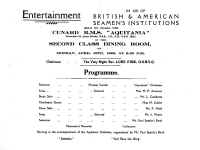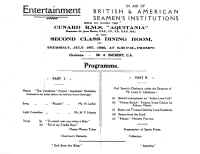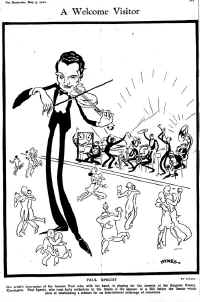|
Part
Four: Paul Specht and his Orchestra; 1926.
By
the beginning of 1926, Specht had expanded his booking agency still
further. Variety for January 13th carried an article to the effect
that eight Specht bands would be playing in China during the coming
year, and also one band in Melbourne, Australia. The article also
referred to the visit to England of the Canadian Club Orchestra, and
stated they: “.. .will become the feature Columbia recording orchestra in England replacing the Savoy Orpheans and Havana bands, prior recorders for Columbia.” Quite
apart from the Canadian Club band becoming the “feature Columbia
orchestra”, neither of the two Savoy bands mentioned had recorded
for that company since late 1924! It
was about this time the Willis-Vaile Bill was put before the Senate
and Congress in America Introduced by Senator Willis and Congressman
Vaile, it sought “reprisals against discriminatory entry of American
professionals into any foreign country”. This Bill had been agitated
for by Specht; following his experience in England in 1924, and was
clearly aimed at England rather than any other country. Despite
various meetings and discussions the Bill failed to get passed, the
State Department taking the view that adequate protection already
existed for American professionals through the strict immigration laws
in America. It also appears that no other American bandleaders
supported Specht in the matter, and this had been duly noted by the
State Department. (Curiously,
the proposed Bill took no account of the restrictions imposed by the
American Federation of Musicians against English and foreign bands
working in America) As mentioned in the previous instalment; Paul Specht brought over his own orchestra in late Spring of 1926. It seems he was determined to try and make a good impression, perhaps in view of his previous experiences in England. With this in mind, he typed a note of instructions to the members of his orchestra, which appears to be so unusual it is worth repeating here: A
REQUEST FOR YOUR FULL CO-OPERATION Enclosed
you will find record check which I will cash for you upon arrival in
London, and another record check is on its way from N.Y. Now,
about our venture into England: Y I I I I Rough
house yelling and carrying on will not be tolerated by any English
managers nor the English public. You have heard some sad, humiliating
stories about the flop other American bands have experienced, so when
I offer any suggestions, THINK first and KICK to me personally in
private, as I have played in England before and may have some first
hand information for our mutual benefit. We will have COMPETITION, so
LET’S set a real RECORD that will be hard for others to follow.
FIRST IMPRESSIONS are LASTING, so let’s start NOW! AND DON’T KICK
UNTIL YOU’RE SURE THAT I HAVEN’T DONE MY DAM BEST TO MAKE THINGS
CONGENIAL FOR YOU, and REMEMBER that COURTESY and a little FAVOR now
and then will bring it’s reward from others. THANKS
BOYS and don’t forget to have your instruments clean and shined! Paul
L. Specht April
20, 1926. Reading
the above, one is inclined to wonder what sort of discipline problems
were expected, or indeed, what had occurred on previous visits! A
copy of the original document can be seen here, together
with programmes of Ship’s Concerts on the outward and return
voyages, in which individual members and the full band took part.
The
band departed from New York on the RMS Aquitania on 13th April 1926.
The trumpet player Charlie Spivak discovered he had no passport just
before they were due to sail, and (quite literally) had to be left at
the dockside! After an uneventful voyage, they arrived at Southampton
on 20th April. The Passenger List (BT26/ 827) shows the following musicians:-
The
sharp-eyed will notice the name of William Wolfe, a former member of
the Carolina Club Orchestra
who visited in 1924. He joined Specht’s own orchestra shortly after
that visit. Paul Specht’s wife Dorothy, aged 28, accompanied him on
this trip; they gave their address in London as 18, Charing Cross
Road. The address of the other members of the band was given as The
Royal Palace Hotel, London. On
23rd April, the orchestra made their first appearance at the Empress
Rooms in the Royal Palace Hotel, Kensington, for the benefit of the
musical press, and started the following day on an eight-week
engagement During this time they alternated evening performances with
the resident (British) hotel orchestra, led by Leslie and Cecil
Norman, each band playing one set in turn. There were similar
arrangements for the afternoon tea-dances, which were very popular at
that time. It
had been intended that after the engagement in London, the Specht
Orchestra would play further engagements in Switzerland and Germany.
However these did not materialize and the musicians had a few days
holiday in London before embarking on 26th June, again on the
Aquitania, to return to New York According to the Passenger List (BT27/1 138), the following were on board:-
According
to Variety’s issue of June 30th, “Paul Specht returned to London
from the Continent this week and probably will sail for New York
Saturday. His bandsmen are already on the water, homeward bound. Paul
remained behind to attend a conference with the Piccadilly (Hotel)
management having to do with arranging for a permanent understanding
calling for periodical London engagements over a long term.” By this time the Musicians’ Union in England were becoming so concerned at Specht’s actions and proposed activities that they wrote to Joseph Weber, the President of the American Federation of Musicians. Their letter, dated June 21st, 1926, read as follows:- Dear
Mr Weber, Until
we get advice from your Federation that he is entitled to open up
negotiations on your behalf; we do not intend negotiating with him
& we shall be glad for a line at your earliest convenience,
letting us know what is the exact position for our future guidance. Yours
fraternally, Wiiliam Batten; Secretary. The reply from Mr. Weber was indeed prompt.. ..and very much to the point! Dated July 1st, 1926 it is too long to reproduce in full here. However the opening and closing paragraphs, and main points addressed by Weber, were: Dear Mr. Batten, I
beg to acknowledge receipt of your interesting communication as well
as copies of your correspondence with Mr. Paul Specht 1)
Specht does not represent the AFM, and purporting to do so, directly
misleads. 2) Specht’s statement to the effect that the AFM Convention voted binding instructions to the National Executive Committee (of the AFM) to investigate and sponsor legislation regarding reciprocal relations with foreign musicians is quite untrue. (Refers to Willis-Vaile Bill) 3)
Specht made the same mis-statement to a Congressional Committee,
concerning which members of the AFM were incensed at the next AFM
Convention. 4)
Specht’s statements concerning the number of English musicians
employed in the USA are totally inaccurate and take no account of the
many who have emigrated there and taken up US citizenship. 5)
No one knows anything of the International Society of Artists which
Specht refers to, and the million artists who are members exist only
in his imagination. You
may give this communication all the publicity you desire. With best wishes for the continued success of your organisation, I remain, Fraternally yours, Jos.
N. Weber, Melody
Maker in October 1926 duly reported this correspondence, quoting both
letters in full and commenting that it did indeed discredit Specht
although they also expressed concern at the clear opposition of both
organisations to any reciprocal arrangements for English and American
musicians. In
view of the ongoing difficulties over Work Permits, The Kit Cat Club
now proposed to Specht that a scheme be set whereby bands could be
employed at the Club consisting of equal numbers of British and
American musicians. Variety duly reported this proposal, and commented
that the Kit Cat would be applying for a Work Permit for Specht alone
to visit England, for the purpose of organising such bands. On July
13th,Specht wrote to Sylvester Ahola, concerning a forthcoming
engagement in America. it is worth noting here that Specht went on to
say: The
Kit Cat Club duly applied for Specht’s Permit but it was refused.
(Without explanation, which was the normal practice of the Ministry of
Labour.) As
he had done two years earlier, Specht started to lobby government
officialdom in America to put pressure on the British Government to
admit him into England. Variety for August 11th carried a lengthy
article on the matter, headed “State Dept Inquiring Into English
Permit Refusals", stating that “...the State Department is
again endeavouring to intercede for Paul Specht...” Again, no
mention was made of opposition by the AFM. Variety
for August 18th commented that Specht had agreed with the Kit Cat Club
and the Piccadilly Hotel that he would send over a nucleus of
Canadian, Irish and Scottish musicians should Work Permits be refused
for himself and American musicians. It also stated “.....Specht
holds a contract with the Kit Cat and Piccadilly as general musical
director....Specht is to send three units over to the Kit Cat and
Piccadilly, originally intending to have the personnel half British
and half American.” Variety for August 26th carried a report that “England Bars Specht Whether On Business Or Pleasure Trip” and stated that the American Embassy in England had been instructed to intercede on Specht’s behalf. However, a brief item on the same page noted the US State Department had written to Specht making it clear that England was within its rights to exclude who they wished. They had apparently also taken the unusual step of making public their correspondence with Specht and others he had appealed to for assistance. The
whole affair rumbled on for another ten days or so. Variety of September
1st. stated “Specht Incensed; Will Get Even On Bands” and spoke of
his determination that none of the bands he booked in England would
contain any London dance band musicians. However on September 7th, Variety
carried a front-page headline “England Admits Bands; Paul Specht Gets
Permit To Go To London”. It appears that discussion between the
American Embassy and the Ministry of Labour in London had resulted in
Specht being allowed to enter the country and organise bands, but not to
make personal appearances. It is
rather odd, but despite all these diplomatic manoeuvres, I have been
unable to find any evidence to date that Specht actually came here at
this time. Be that as it may, by the end of 1926 he had been replaced as
Musical Director at the Kit Cat and Piccadilly. This position was now
taken up by Jack Hylton, no less, and duly reported in Melody Maker for
December, 1926. In view of Specht’s long-time antipathy towards
Hylton, it must have been galling indeed! At
about this time, Jack Hylton and his band also appear to have been
offered a booking in America by the B. F. Keith Circuit, a well-known
theatre chain. Specht took steps to try and block this visit, but was
told by the U. S. State Department he could not do so. In the event
Hylton’s visit was cancelled, owing to the inevitable opposition from
the AFM. This
is a convenient point at which to pause; the final instalment will cover
Specht’s activities relating to England during the late Twenties and
through the 1930s.
Click
here for the final part: Part
Five: Paul Specht; the later years
|


